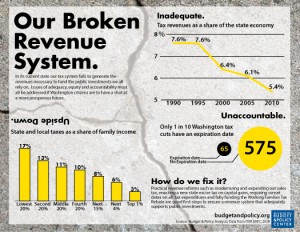OPINION
2012 session was bittersweet, but certainly not ‘bipartisan’
 By JEFF JOHNSON
By JEFF JOHNSON
President’s Column
2012 WSLC Legislative Report
The 2012 Legislative Session limped bleary-eyed to a close at around 7 a.m. on April 11 after a 7-hour second “special session.” It was a bittersweet ending to a bittersweet session.
There were great highs: the passage of the Marriage Equality Act and the eventual passage of the Infrastructure Jobs Bonds — the “Jobs Now” bill. There were also great lows: eliminating the early retirement pension factors for new public employees who have put in 30 years or more of service and the way in which school employee health benefits was dispatched.
But perhaps most disconcerting was the claim by many legislators and the governor that the grand finale shows what can be achieved through the spirit of “bipartisanship.” What a load of hooey!
Bipartisanship connotes working cooperatively across the aisle, having a clear understanding of the issue at hand and the problem to be solved, and if consensus can be reached, putting forth a solution that can be viewed by most at least as fair.
Bipartisanship is not holding the budget and job creation hostage to an ideological wish list. That is called coercion, not cooperation. Now, coercion has always been a part of politics. But let’s have the intellectual honesty to call it what it is. It is not bipartisanship.
When Democrats mislabel the disassembly of our public employee pension system, or last year’s attacks on the workers’ compensation system through “compromise and release,” or circumventing our competitive bidding laws as “bipartisanship,” they help to legitimize what is nothing more than attacks on working people.
Eliminating the gains that our public servants made over the last decade, making it easier and fairer to retire before age 65 without significant penalties once you have put in 30 years or more of public service, was touted as a fix to the state’s budget woes. For those legislators who actually believe this, their math is as faulty as their sense of fairness. The fiscal note on the pension deform bill estimates a $1.3 billion savings over the next 25 years. Compare this to some $900 billion of operating budget expenditures that will be made over that period and the savings are about one-tenth of one percent.
 We do not have a pension problem. We have a revenue problem.
We do not have a pension problem. We have a revenue problem.
If anyone ever needed proof that Initiative 1053 requiring two-thirds supermajorities in the Legislature to raise revenue does not work, proof positive can be found in this year’s closure of just two financially insignificant tax exemptions, from the more than 600 tax breaks on the books. I-1053 allows 17 state senators to subvert the will of the majority and it is crippling our state’s social infrastructure. We do not raise enough revenue to support a world-class education system, provide quality public health services, take care of our sick, elderly and poor, or fairly compensate our public employees. It is time for all leaders to call the question on I-1053. The common good is being strangled by the inability to realistically consider revenue options. It is time to repeal I-1053.
Rob McKenna and the 2012 Legislature
When the Senate Republicans, with the help of Roadkill “Democrat” Senators Rodney Tom, Jim Kastama and Tim Sheldon, took control of the Senate and passed an operating budget that had never been heard or seen, we got a preview of what a Rob McKenna administration would look and act like. Apparently, transparency in government will not be a priority. In 2003, the last time the Republicans controlled the Senate, they gutted the unemployment insurance system at 6 a.m. during the third “special session” with a bill that had never been heard in public and was not available for reading until after the session adjourned.
While rumors abound regarding the level of influence McKenna had on the Republican budget that cut education by another $75 million, all you have to do is look at his website to get a sense of how he would reshape state government. McKenna vows to eviscerate collective bargaining rights, contract out state services, increase employee health care costs by two-thirds, privatize the workers’ compensation system, and the list goes on. Even Scott Walker of Wisconsin was more subtle than this guy.
It’s time to pull the sheep’s clothing off of the McKenna wolf. If he is elected governor, we will get more politics of diversion, more denigration of public service, and more attacks on working people.
It is time to elect political leaders who have the vision and the courage to say that it will require a fair revenue system and greater investments of that revenue in our social and physical infrastructure to create a vibrant economy and civil society in Washington state. Let’s choose a vision of creating jobs, a fair system of public revenue, and shared prosperity rather than an anti-government ideology and corresponding set of ideas. That “road kill” isn’t in the middle of the road, it’s on the far right shoulder, and it needs to be swept aside.
Jobs
They couldn’t do it at the national level. But after six months of organizing around the “Jobs Now” bill, a total of $1.6 billion (including federal match money), will be invested in jobs that will help strengthen our state’s infrastructure. This will create around 18,000 to 20,000 direct and indirect jobs in the construction industry and other sectors of the economy. It will also contribute much-needed revenue to the state general fund over the next couple of years.
We owe a great debt of gratitude to Rep. Hans Dunshee (D-Snohomish) who tirelessly fought for and led this effort. We also recognize House Speaker Frank Chopp’s unwavering support for the Jobs Now package. Without the Speaker’s support this package would not have survived. Sen. Derek Kilmer (D-Gig Harbor) championed the package in the Senate and was instrumental in leading that body to understanding and accepting the need for job creation. Finally, it is important to recognize the support of Sen. Linda Evans Parlette (R-Wenatchee) and Rep. Judy Warnick (R-Moses Lake).
But this is just a first step. Unemployment in our state is still 8.3%, four years out from the beginning of the “Great Recession.” We have a lot more to do from the public side of the equation to leverage job creation in Washington state. It’s time to get down to work.
Jeff Johnson is President of the Washington State Labor Council, AFL-CIO, the largest labor organization in the Evergreen State, representing the interests of more than 500 local unions and 400,000 rank-and-file union members.





